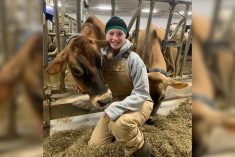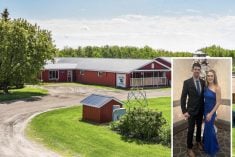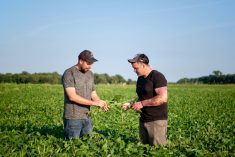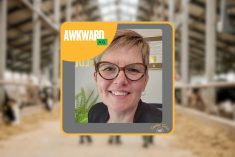Dwayne Logan is convinced. Any new farmer not starting off with a lot of money or help from their parents is better off taking the sustainable farming route, Dwayne tells me as we walk the 600 acres he and Shelley farm near Nesbitt, about 15 minutes south of Brandon, Man.
The question is, what does Dwayne mean by better off?
It isn t size. The Logans are hoping to expand but they will always be smaller than neighbouring farmers. And it certainly doesn t mean sales volume, or net income. They ll never be at the top of those lists either.
Read Also
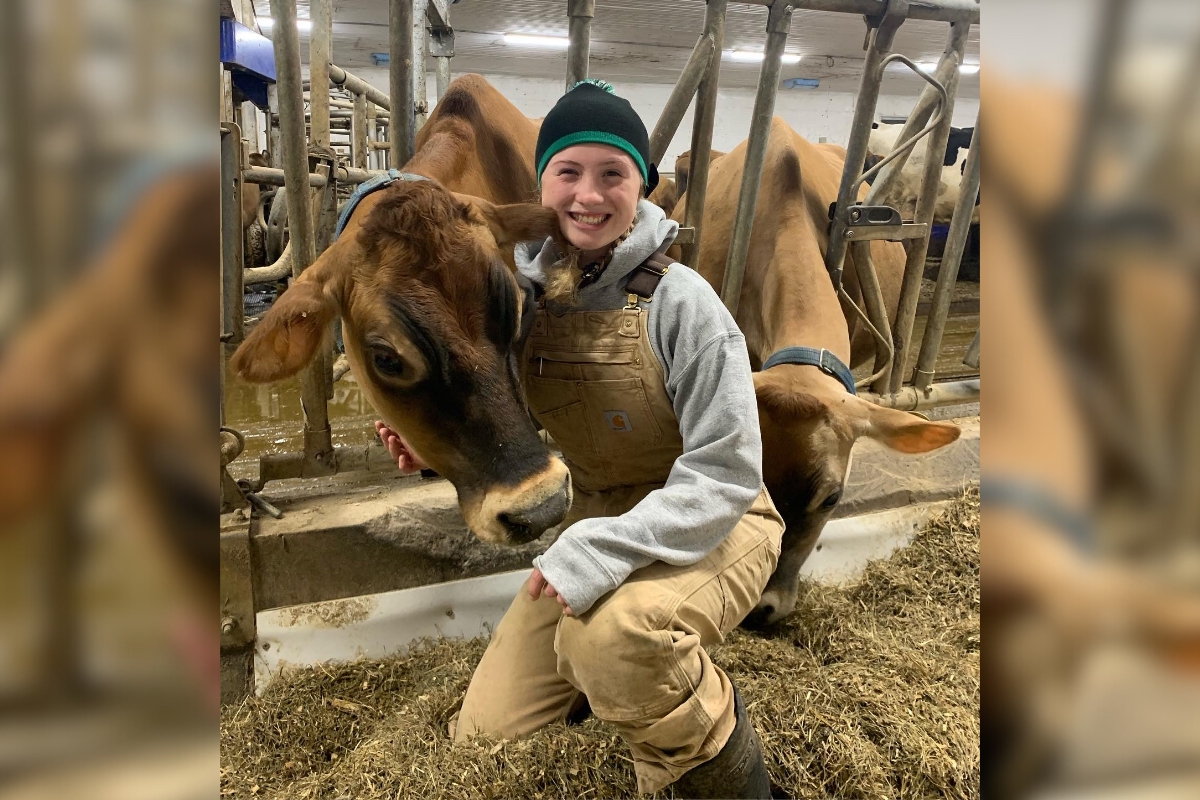
Youth focused on keeping Quebec’s dairy industry strong
In part two of our Making the Future series, Country Guide spoke with Béatrice Neveu from Rawdon, Que. (Read part…
But that doesn t mean the Logans are unambitious, or that their approach to farming and business is unsophisticated. In fact, the Logans argue the opposite, and they believe they have a shrewd business philosophy based on the concept that money is only one of the rewards of business success.
They look to pride, self-worth and family bonds as payoffs too, and they believe that these are payoffs that can be optimized by building a business plan that is designed to do just that. The money has to work out, of course, but business doesn t have to be only about always gunning for bigger bucks.
Besides, Dwayne says, the options aren t great. Getting on the treadmill of always buying more equipment and always farming more acres simply means a life of worry and debt, with a possible big payout at the end.
We were unwilling and probably unable to do that financially, Dwayne concedes. We ve only been able to remain successful in farming through direct marketing, sustainable practices, and diversification.
The Logans have also had to take on off-farm work, carpentering and working as a butcher, and Dwayne has started a business at nearby Turtle Mountain teaching wilderness survival skills to classes from northern tier U.S. states and the Canadian West. It s for anyone interested in the back-to-the-land concept, emergency preparedness, or outdoor recreation, says Dwayne.
It has become a real passion, Dwayne adds. I m very driven to learn and teach people about it.
In fact, that kind of passion and commitment is in its own way the biggest form of capital that the Logans use to keep their farm moving forward. The only way we can healthily grow anything with our dwindling sources of phosphorus and fossil fuels is to put it all back in to create a sustainable system, Dwayne says.
Shelley agrees. Dwayne (35) and Shelley (33) Logan own 495 acres of farmland and rent about another 110 acres. They have left what they view as the typical chemical-intensive method of farming behind, replacing it with natural, sustainable alternatives.
They met unconventionally too, via an online dating service in 2005 when Shelley was working in Winnipeg. They met, found that they had similar beliefs, and as the saying goes, the rest is history. My dad was always adamant that he wanted his cattle to be natural, says Shelley, raised on a dairy farm near Portage.
He took very good care of his animals and instilled that in me, Shelley says. I just thought all farmers were like my dad.
That didn t mean Shelley had all the tools she needed to run a farm. When Shelley s dad retired, Dwayne points out, he sold the dairy farm. Her dad wasn t very open to the idea of the females in the family continuing with the dairy. He thought they should go to the city.
By contrast, Dwayne now believes that Shelley s business thinking is a great asset for their growing farm. I find women are often more willing to be innovative and creative, and are less burdened by tradi- tion or the way things were done by their parents, Dwayne says. Shelley more easily sees changes and improvements.
For us, sustainable farming is critical, Shelley says. Today s farming is all about taking from the land. Farms operating like that pay for their depleted soil through fertilizer and pest control bills.
Although it s hard to put one or two crops into a summerfallow or a green manure crop on a large farming operation, we believe that for smaller farms, the opportunity to try these things is there, Shelley adds. That will hopefully keep them going& and possibly influence the larger, conventional farmers.
Dwayne has been farming most of his life and has had no formal education past high school, but says that both he and Shelley have learned through their research and their connections with low-input farming that their farm s success hinges on diversity.
Now, they are taking that learning and applying it more broadly. Diversity is critical for their business health, not just for healthy crops and livestock.
On the farm, the Logans use the closed-system concept, trying to retain and recycle as many nutrients as possible. Each year, the couple divides their acreage with one-third for pasture, one-third for hay, and one-third for cereals.
Their main business focus is on selling direct-marketed meat. We work to get the most sales per customer by supplying many different options, says Dwayne, noting they raise sheep, goats, beef cattle, Berkshire pork, and chickens. The beef, lamb, and goat are all grass fed. The pigs and poultry are pasture raised. Rotational grazing and cropping are the biggest tools we have for maintaining the health of the animals, land, and grasses.
Dwayne started out by buying a quarter with help from his father. After a few years focused on getting his feet under him, he bought another quarter and got married to Shelley. Then when his father retired, they took over the home farm, and soon after, daughter Willow was born.
The Logans may expand further in the near future. There are two other quarters of land being rented to other farmers that they are considering taking on as they grow their operation.
The changeover from conventional to sustainable farming, personally and financially, has been worth it, says Dwayne. We wouldn t be farming if we weren t going this route. The farming industry is growing so quickly. People borrow and get into debt just to keep pace and stay competitive.
Still, the plan has required off-farm income. To get enough income from a small farm is a challenge, so any extra income makes a big difference, Dwayne agrees. As noted above, he has worked as a carpenter, and he now works at Prairie Rose Meats, a butcher shop in Souris where he helps to butcher beef, bison, lamb, goat, and pork (full time in the winter, and one day a week in the summer).
Dwayne also admits to liking a good dose of variety in his life, continuously learning new things. This is why I started a wilderness course. The two-and three-day courses are hosted by David Neufeld of Room to Grow (an organic greenhouse and bed and breakfast). Dwayne and coinstructor Laura Reeves, a botanist from Prairie Tall Grass Reserves Manitoba, teach wilderness and urban survival skills as well as traditional farming skills ranging from blacksmithing to hide tanning.
It s also very good income, and is something I can pick and choose how much I want to do each year& because the 9-to-5 thing doesn t work, being a farmer, Dwayne says.
We re overwhelmed with people contacting us, wanting to visit our farm or learn skills, and people wanting reliably good-quality food. Again, though, it s a business strategy that comes full circle, satisfying the Logans because it generates income, supports the other facets of their farm, and feeds them on a deeper level, helping re-assure them that they are heading in the right direction.
They also expect more farmers to move in their direction. Says Dwayne, It s inevitable that we ll return to a smaller-scale, local way of existence. CG


